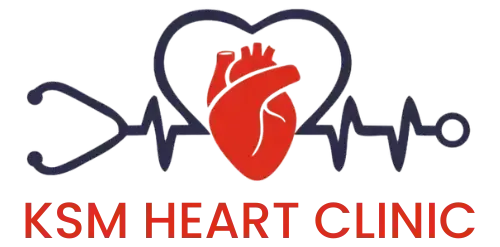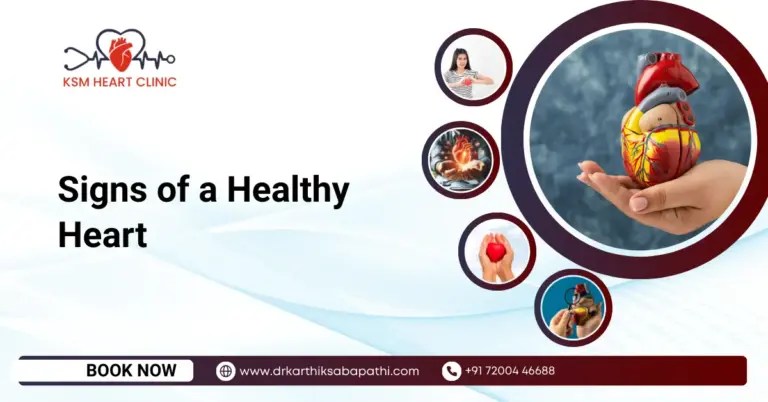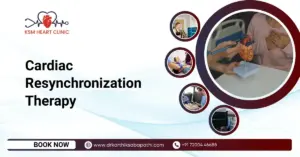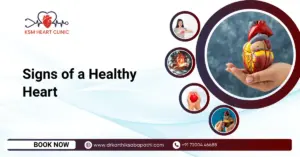A healthy heart is the foundation of a strong, energetic, and active life. When your heart functions efficiently, it ensures proper blood circulation, stable energy levels, and optimal organ performance. Recognizing the signs of a healthy heart helps you understand whether your cardiovascular system is functioning at its best. By knowing what indicates good heart health, you can take proactive steps to protect it, reduce disease risk, and maintain long-term wellness. This awareness empowers you to adopt positive habits and stay alert to changes that might require medical attention.
How Do You Know Your Heart Is Healthy?
A healthy heart supports every activity you perform from walking and sleeping to working and exercising. But many people do not realize how to check if their heart is functioning well until symptoms appear. Understanding the signs of a healthy heart allows you to assess your cardiovascular wellness with confidence.
1. Good Energy Levels Throughout the Day
When your heart pumps blood efficiently, your body receives the oxygen and nutrients it needs to stay energetic. This prevents fatigue and helps you stay active without feeling constantly tired. If you can perform your daily tasks without frequent exhaustion, it’s usually a good indicator of heart health.
2. Ability to Exercise Without Difficulty
A healthy heart adapts well to increased physical demand. If you can walk, climb stairs, or exercise with minimal shortness of breath, your heart is functioning efficiently. Quick recovery after workouts is another positive sign.
3. Normal Blood Pressure and Heart Rate
Consistently normal blood pressure and a stable resting heart rate are strong markers of heart wellness. A heart that beats steadily and maintains pressure within the normal range does not have to work extra hard to circulate blood.
4. Strong Circulation
Healthy circulation ensures warm hands and feet, faster healing, and better skin tone. Poor circulation can indicate arterial stiffness or reduced heart efficiency.
5. Good Sleep Quality
People with strong heart function generally experience restful sleep because their cardiovascular system supports healthy breathing and relaxation.
Incorporating lifestyle habits such as how to keep your heart healthy naturally including regular activity, a nutritious diet, stress control, and limited alcohol consumption—helps you maintain these positive indicators over time.
5 Signs You Have a Healthy Heart
Recognizing positive indicators of cardiovascular health provides reassurance and motivation to continue your healthy habits. Understanding the 5 signs you have a healthy heart gives clarity on your current wellness level and highlights areas you can improve.
1. Healthy Blood Pressure Levels
Normal blood pressure shows that your heart and arteries are working smoothly. High or low readings may indicate circulation problems, vascular stiffness, or heart strain. Stable blood pressure is one of the essential signs of a healthy heart.
2. Balanced Cholesterol
Healthy cholesterol levels prevent plaque buildup in arteries. When good cholesterol (HDL) is high and bad cholesterol (LDL) is controlled, your heart pumps blood easily without resistance.
3. Strong Breathing Capacity
If your lungs and heart work together efficiently, you won’t experience frequent breathlessness. This is one of the most reliable signs of a healthy heart, especially during moderate physical activity.
4. Good Physical Endurance
Exercise performance reflects heart strength. The more easily you perform physical tasks, the healthier your heart likely is. This is also one of the 5 Signs You Have a Healthy Heart, showing your cardiovascular system is functioning at a high level.
5. Good Emotional and Mental Stability
A regulated heart supports hormonal balance and stress control. Reduced anxiety, stable emotions, and fewer stress-related symptoms indicate healthy cardiovascular function.
Common Symptoms of Heart Attack
Understanding heart attack warning signs is crucial because early detection can save lives. While knowing the signs of a healthy heart is important, being aware of symptoms that indicate a heart attack is equally essential.
1. Chest Pain or Pressure
This is the most common symptom. It may feel like heaviness, tightness, squeezing, or burning in the chest. The pain may spread to the arms, shoulders, jaw, or back.
2. Shortness of Breath
Difficulty breathing without physical exertion is a serious warning sign. Unlike the normal breathing associated with the signs of a healthy heart, this type of breathlessness is sudden and intense.
3. Sweating and Nausea
Cold sweats, dizziness, or nausea often accompany heart attacks. These symptoms occur because the heart is unable to pump blood efficiently during a dangerous blockage.
4. Fatigue and Weakness
Sudden weakness or extreme tiredness, especially in women, can signal reduced blood flow to the heart.
5. Rapid or Irregular Heartbeat
A fast or uneven heart rhythm should never be ignored.
Adopting tips for maintaining a healthy heart such as controlling weight, reducing stress, quitting smoking, and exercising regularly can significantly reduce heart attack risk.
Tips for Maintaining a Healthy Heart
Building heart-healthy habits is the most effective way to avoid disease and strengthen cardiovascular function. When these habits become part of your lifestyle, you will gradually notice the signs of a healthy heart becoming more consistent.
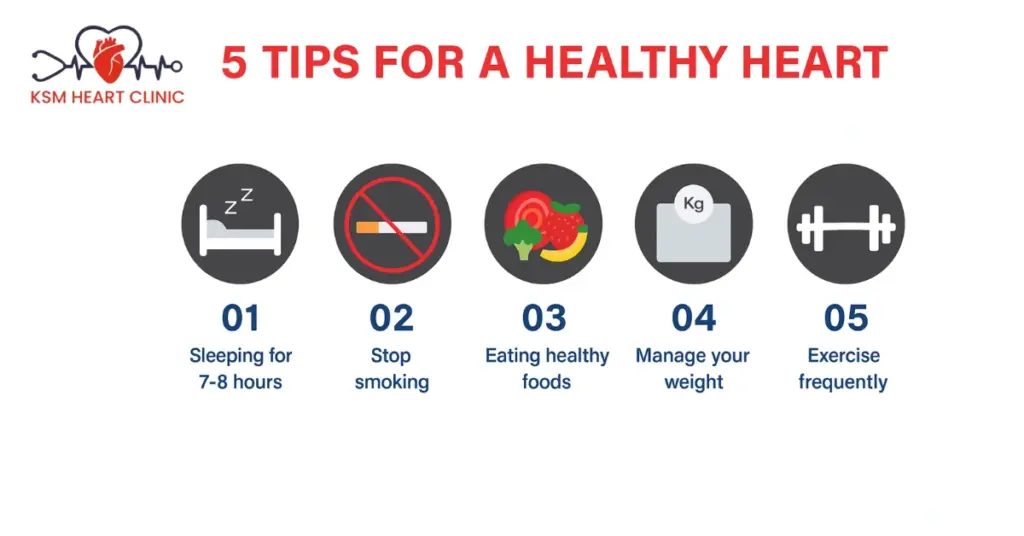
1. Stay Physically Active
Aim for 30 minutes of exercise daily. Activities like walking, swimming, and cycling improve circulation and strengthen the heart muscle.
2. Eat Nutritious, Balanced Meals
Include leafy greens, whole grains, nuts, legumes, and lean proteins. Avoid trans fats, excessive salt, and sugary foods.
3. Manage Stress
High stress increases blood pressure and heart strain. Meditation, yoga, and controlled breathing can help.
4. Get Regular Health Checkups
Monitoring blood pressure, cholesterol, and sugar levels helps detect issues early. This allows you to maintain the 5 signs you have a healthy heart consistently.
5. Prioritize Sleep
A well-rested body supports a stronger cardiovascular system.
How to Protect Your Heart
Heart protection means preventing disease before symptoms appear. By securing your cardiovascular health early, you can enjoy long-term vitality and avoid major complications. Observing repeated signs of a healthy heart indicates that your protective measures are working well.
1. Keep a Healthy Weight
Excess weight puts additional pressure on the heart and increases the risk of hypertension and diabetes.
2. Limit Alcohol and Avoid Smoking
Both habits weaken the heart, harden arteries, and disrupt circulation.
3. Control Chronic Conditions
Diabetes, high blood pressure, and high cholesterol should be monitored and treated early.
4. Maintain Daily Activity
Movement prevents blood stagnation, supports oxygen flow, and strengthens heart muscles.
Integrating these practices aligns with effective tips for maintaining a healthy heart, helping you build lifelong cardiovascular protection.
Conclusion
A strong, healthy heart supports every part of your life from physical activity to emotional well-being. Understanding the signs of a healthy heart in your daily routines helps you stay alert, motivated, and proactive in your health journey. By choosing heart-friendly habits, eating nutritious foods, staying active, and scheduling regular checkups, you can significantly lower disease risk and build long-lasting cardiovascular strength. Take the next step today—prioritize your heart, stay informed, and protect your future health with mindful, consistent care.
